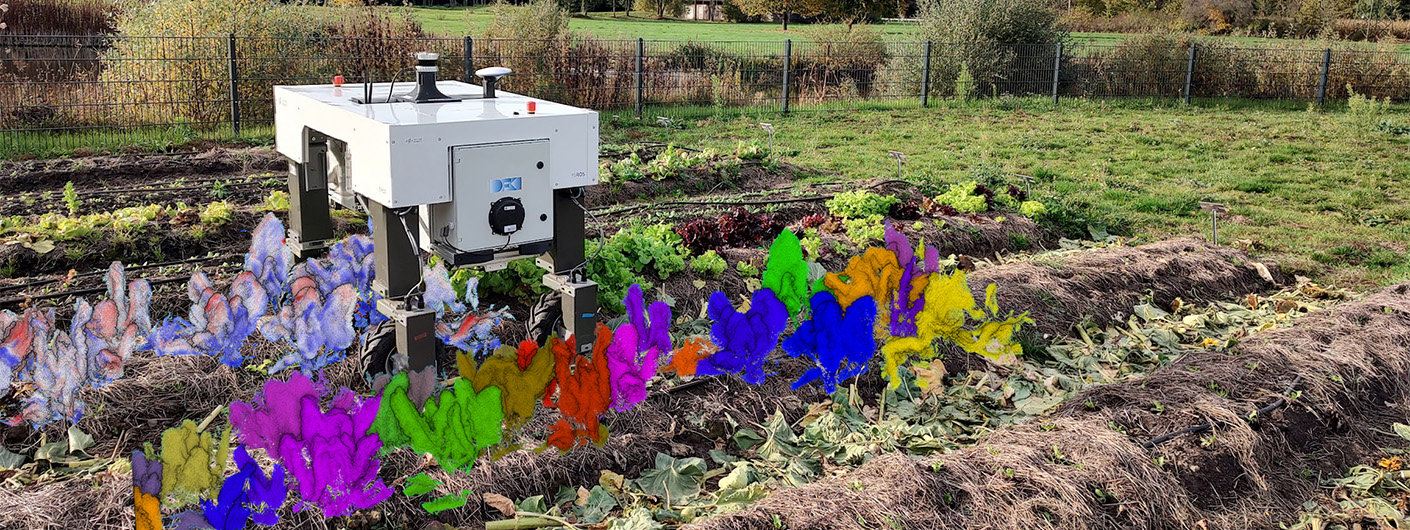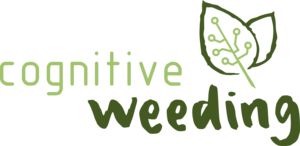
Nature Robots develops autonomous robots for regenerative agriculture. Based on the self-built long-term autonomous monitoring robot „Lero," the company creates temporally and spatially high-resolution, three-dimensional plant maps of crops and weeds, which are transferred into a monitoring interface for agronomists, farmers, and plant breeders. The AI and robotics systems allow use in naturally and arbitrarily structured environments such as vegetable, fruit, and grape growing, as well as agroforestry, forestry, photovoltaic, and agro-photovoltaic environments. Nature Robots is a spin-off of DFKI and was founded in January 2022 in Osnabrück.
Plantmap - Three-dimensional plant map

The project's goal is a temporally and spatially highly resolved three-dimensional map of individual plants and entire beds to support organic farming. Combined with the Move Base Flex navigation and control software, Plantmap enables autonomous navigation in steep and unstructured terrain such as vegetable, fruit, or market gardens and agroforestry farms. This allows an autonomous robot to track the condition and development of individual plants, their shape and phenotype, and key plant parameters on a daily basis to gather recommended actions, AI training data, and new knowledge about the complexities of bio-intensive agriculture. Taken together, this database can significantly contribute to optimizing organic farming practices, potential methods, and technologies.
PlantMap (Powerful Long-term Autonomous Navigation Towards Monitoring Agricultural Plants) is funded by EXIST research transfer and coordinated by DFKI.
Further information: https://naturerobots.de/tech/3d_plant_mapping
Cognitive Weeding – Companion Plant or Weed?

Crop plants in the field have two kinds of companions: undesirable weeds and weeds that do not affect the crop and may even be worth protecting. The CognitiveWeeding research project aims to develop a different view of the field companion flora and weed control. Considering yield security, the focus is on biodiversity conservation and enhancement in organic and conventional crop production. The approach goes beyond the current cropping period and crop rotation. The classification takes into account the farm-specific crop production as well as the given site and weather conditions in the context of crop rotation and the impact on biodiversity on the respective (sub)area. With the nature-based, innovative development of an AI-based decision-making system for species-rich weed management, Cognitive Weeding contributes to overcoming current ecological challenges. The project is funded by the German Federal Ministry for the Environment, Nature Conservation, Nuclear Safety, and Consumer Protection (BMUV).
Further information: https://cognitive-weeding.de/projekterklaerung
5G-Agrar – Sustainable Agricultural Economy

For the agricultural industry, 5G offers the possibility of collecting large amounts of data, and analyzing it in real-time, thereby optimizing agricultural processes on a large scale. With of new technologies, the entire value chain should be made more sustainable and transparent, as well as ensure the future viability of upstream and downstream industries. The project's goal is a more sustainable agricultural economy, which enables demand-oriented actions based on real-time data evaluation. The district of Vechta in Lower Saxony was selected as part of the 5G innovation competition for implementation funding from the German Federal Ministry of Digital Affairs and Transport (BMDV). DFKI at the Lower Saxony site is one of the project partners.
The aim of the BMDV funding is to enable demand-oriented decisions in agriculture through the use of 5G and, at the same time, to contribute to the sustainable use of resources. New ways are continuously being sought to make food production more efficient, sustainable, environmentally friendly, and transparent. In agriculture, data has only been collected selectively within the value chain. In animal husbandry, illnesses can be prevented by combining real-time animal movement data with other data from the barn and from other stages of the value chain (e.g., health data from the parent animals or slaughter findings). With the help of artificial intelligence, farmers can take targeted action in animal health care for each individual animal and thus, for example, reduce the use of antibiotics.
Further information: https://www.dfki.de/web/forschung/projekte-publikationen/projekt/5g-agrar


